Season 2 of the Chronicles was originally published on Medium. I started writing it, like previous episodes of Chronicles, in graphic novel form and include images I created using AI and the Scratch drawing tool but, well it’s the story that matters — the world I’m attempting to build . The illustrations may help but only the text is necessary in this episode. Actually, if you are reading this on a smartphone just ignore the graphics.
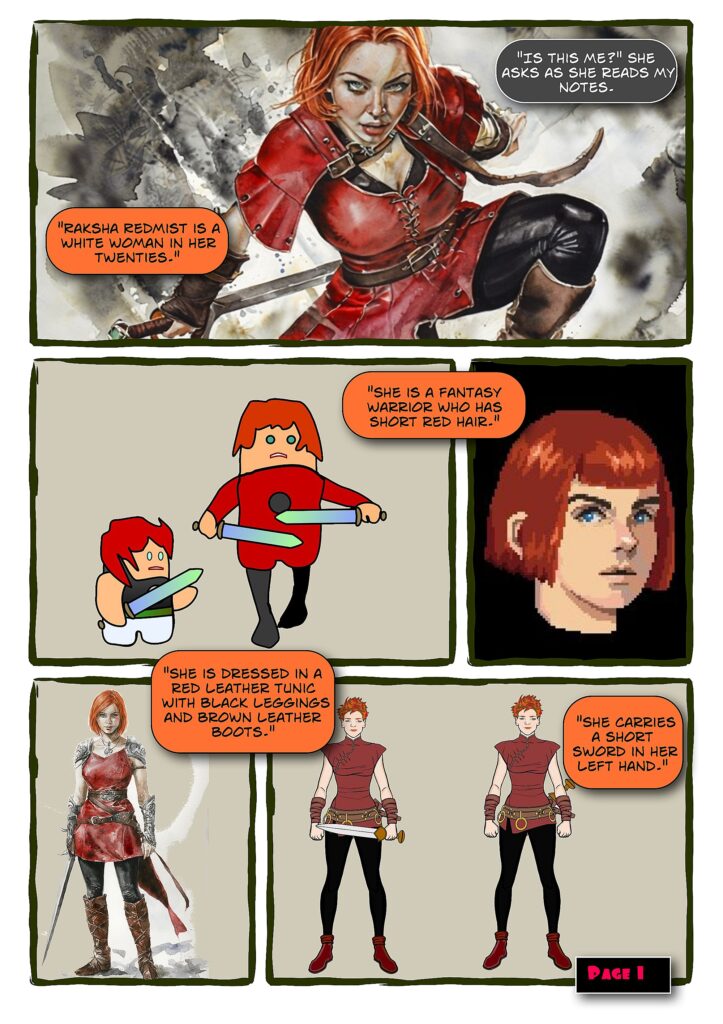
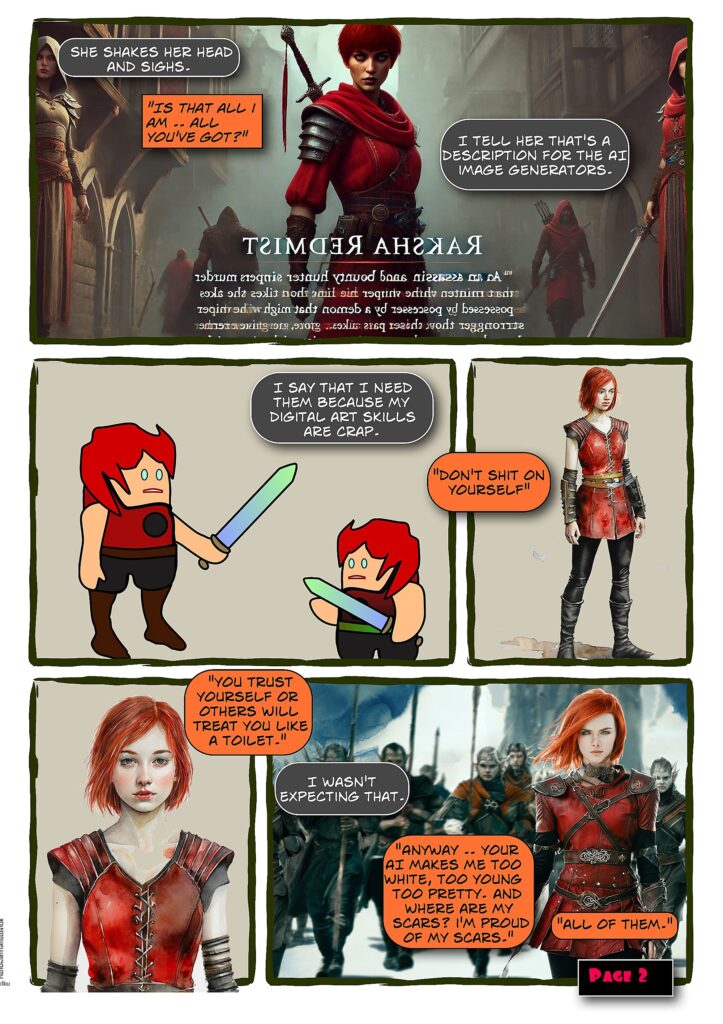
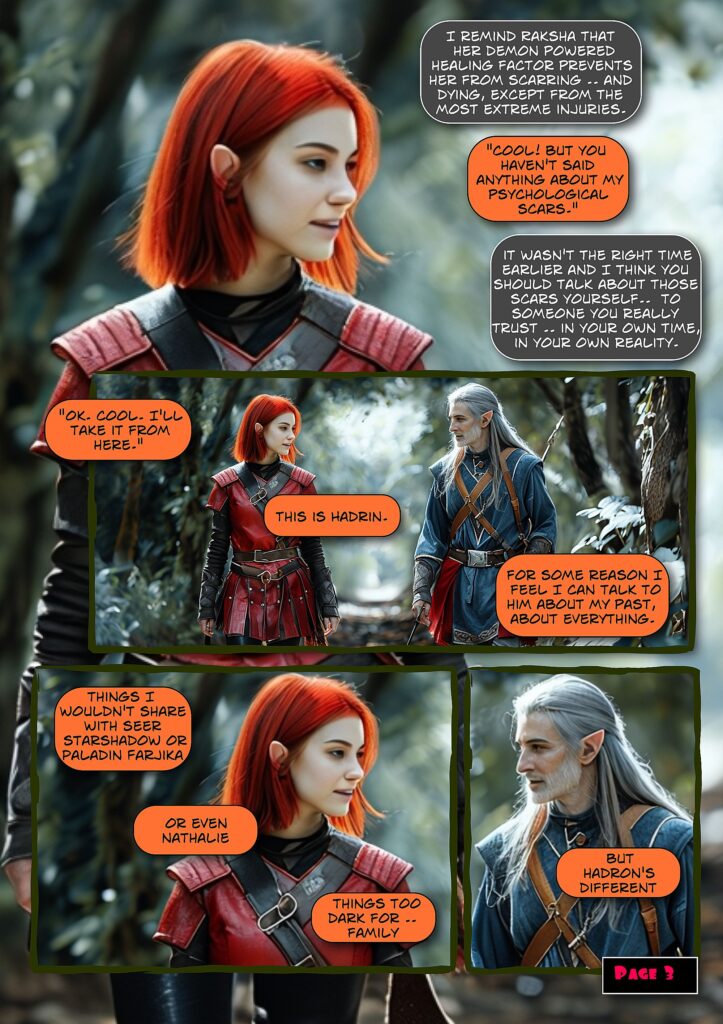
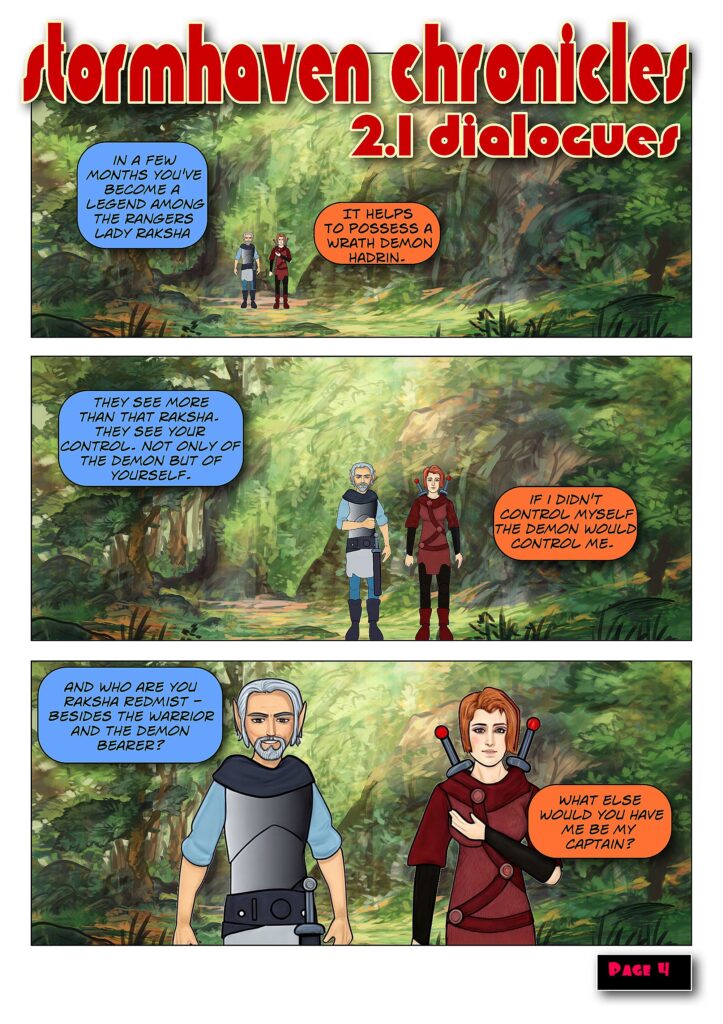
“In a few months, you’ve become a legend among the Rangers, Lady Raksha,” says Hadrin Winterwise, breaking the silence between us.
It’s early autumn in Narshadow. We’re walking through the forest back to the Rangers’ encampment from the war camps of the Dwarakai and Orakai armies. I had told Hadrin that I had never met a living legend before, thinking back to our meeting with the Dwarakai King, Thrain Ironheart. Once, it would have been impossible to even imagine Dwarakai, Elvakai, and Orakai leaders sitting in the same pavilion, strategising on how best to protect Manakai, humans, from other humans. But then Thrain — he wasn’t a king then — alongside Caladris Whisperwind and Grak Bloodaxe, forged the alliance known as “The Brothers Three” and drove the Empire out of the Nar Mountains.
The giant Orakai leader had said nothing but that he would go wherever Thrain led. Gore Bloodaxe was Grak’s son and regarded Thrain as an uncle.
“Hadrin, you know the situation better than any man,” Thrain began. “Your Rangers have driven the Adzar forces back to their stronghold of Stonekey and held them there. But the Empire’s armies are just two weeks away. We have to take Stonekey before they arrive.” His voice was steady, resonant with decades of experience as a leader. “The tunnels we’ve built can take us right beneath their walls. We use them, we strike from below, and we take Stonekey before the Empire’s reinforcements arrive.”
“A bold plan, King Thrain, but boldness isn’t the same as wisdom,” returned the Elvakai Ranger, stepping closer to the table, eyes scanning the map of tunnels. “We’ve kept our people alive through guerrilla tactics — small raids, ambushes, always vanishing into the wild before they can catch us. We’ve driven them back into Stonekey by making it too costly for them to venture out. A direct assault, even from below, risks too much. If they catch wind of our plan, the tunnels could become a grave for every soul who ventures through them.”
You might say it wasn’t my place to speak out of turn or disagree with my boss when he was negotiating. But you know I was never one to hold my tongue. “What happens when the Adzar armies and their demon-bearers arrive?” I asked. “When a hundred twisted sorcerers and their possessed drones turn Stonekey into their stronghold? They won’t just reinforce the garrison — they’ll destroy every town, village, and farm from the forest’s edgeto the mountains. And no hit-and-run tactics will stop that.”
“The Rangers know this terrain better than anyone. The forest, the valleys — these are our allies,” replied Hadrin, permitting himself a sigh. “And those demon-bearers? I’ve seen what you can do but also how you do it. They have wrath and power, but you have wrath, power, and intelligence. That’s what makes you so valuable. The Empire’s demon-bearers, however powerful, are mere brutes.”
Thrain slammed his fist on the solid wooden table, shaking mugs and maps. The shortest in our group, Thrain stood broader than Hadrin or me, and though smaller than Gore Bloodaxe in both height and width, I think the muscled Dwarakai king was as strong as the younger Orakai. “This isn’t just about tactics Hadrin. It’s about the lives of all those who look to us for hope. A year ago, I might have agreed with your caution. But times have changed. Stonekey is more than an outpost now. It’s a symbol of Imperial oppression. If we take it, we show them that they are not invincible, that the Nar Mountains will not bow to their chains. And we gain a place to make a stand — a base to launch our own attacks and a wall against theirs. If we leave it in their hands, we may as well abandon Narshadow to their mercies. And we know that they have none.”
“You’re asking me to gamble with the lives of everyone who’d follow us down those tunnels,” Hadrin replied firmly. “My people, your people, Thrain. A mistake here could doom us all. I hear what you’re saying, Thrain, but if we get trapped down there…”
“No plan is without risk, Hadrin. You represent the Nar Elvakai, and you’re our Battle Lord,” said Thrain. “You haven’t lost a single battle because you’ve always avoided those you can’t win. But this isn’t just about winning this or that battle. It’s about shaping a future where our people don’t have to live in fear of the Empire’s shadow. Where Dwarakai, Elvakai, Manakai and Orakai stand and defend each other as Kai — one people.” The king’s tone softened slightly after his rare display of emotion. “I’ve fought for that dream since the Brothers Three stood side by side. I won’t see it lost now because of fear.”
“I hear you both. But if this goes wrong… it’s my responsibility.” Stepping back from the table, the Ranger chief bowed to Thrain and Gore. “Give me time to consider. You’ll have my decision by noon tomorrow,” he said, leaving the King’s pavilion.
We walk in silence through the Dwarkai camp and through the darkening woods towards our own.
“In a few months, you’ve become a legend among the Rangers, Lady Raksha,” he says.
Startled, I quip, “It helps to possess a wrath demon.”
Hadrin smiles. “They see more than that, Raksha. They see your control. Not only of the demon but of yourself.”
I am not used to compliments. I tell Hadrin that if I did not control the demon, it would control me.
“And who are you, Raksha Redmist?” he asks softly. “Besides the warrior, the demon-bearer?”
“What else would you have me be Hadrin?”
“I would have you be a friend Raksha Redmist.”
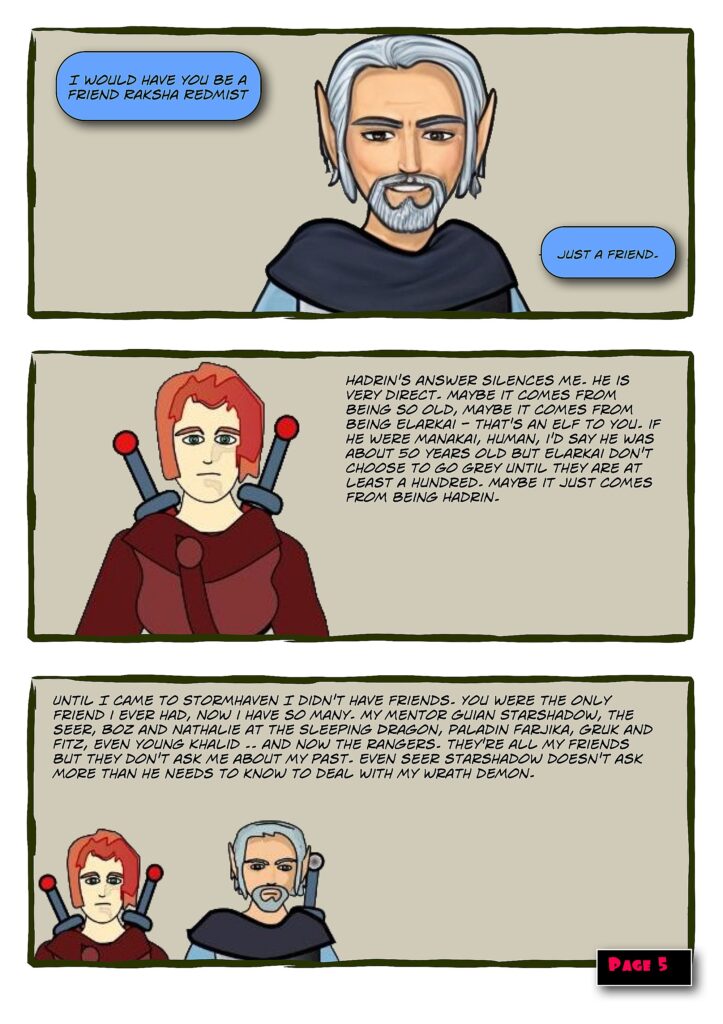
Hadrin’s answer silences me. He is very direct. Maybe it comes from being so old, maybe it comes from being Elvakai — some say elf. If he were Manakai, human, I’d say he looks about 50 years old but Elvakai don’t go grey until they are at least a hundred. But maybe the directness just comes from being Hadrin.
Until I came to Stormhaven I didn’t have friends. Back then You were the only friend I ever had. Now I have so many. My mentor Guian Starshadow, the seer, Boz and Nathalie at the Sleeping Dragon, Paladin Farjika, Gruk and Fitz, even young Khalid .. and now the rangers, they’re all my friends but they don’t ask me about my past. Even seer Starshadow doesn’t ask more than he needs to know to deal with my wrath demon… But Hadrin.
It was night by the time we returned to the rangers’ camp. Hadrin didn’t want to talk about the meeting with Thrain. He asked if I could guarantee that the Empire didn’t know about tunnels that the Dwarakai had been building for decades. We were both tired and we ate late and then sat together staring into the fire.
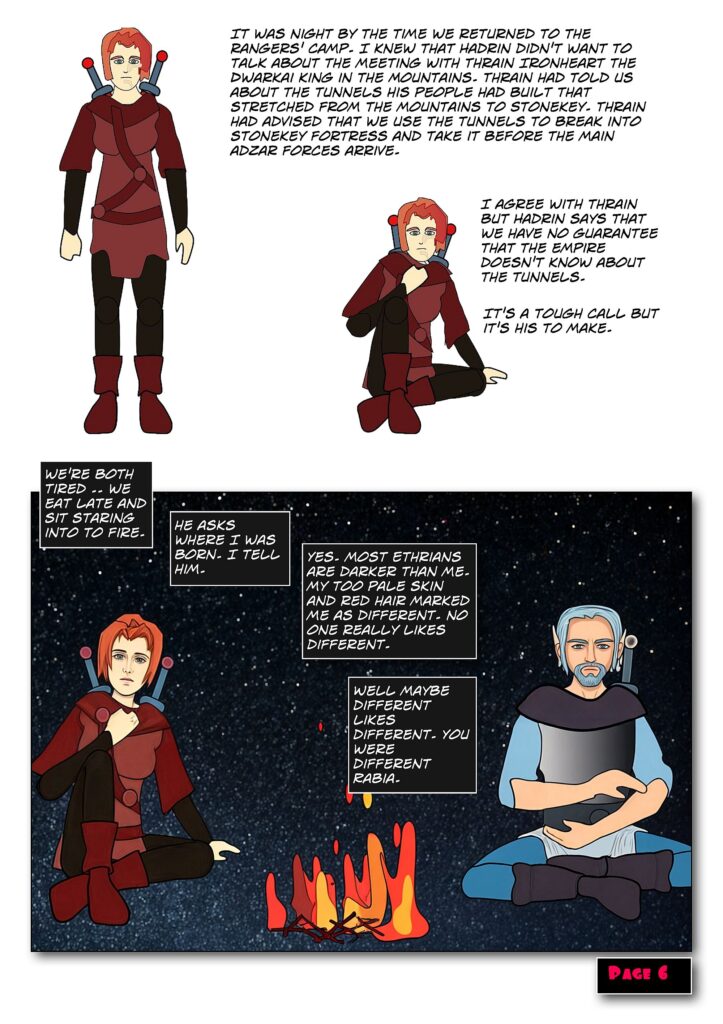
He asks where I was born and I tell him. He comments that I don’t look Ethranian. I don’t, my skin is too pale and my hair is red. I was different and nobody likes different. No, that’s not true. Maybe different likes different. I was the palest girl in the village and you were the darkest. We both stood out. I tell him about you.
“They called me Rahne back then. I wasn’t like the others. The bullying, the whispers… I learned to fight back. Rabia taught me how. She was… everything to me.”
He nods. I continue. Looking him straight in the eye I say “But in our community, being different wasn’t just about appearances. It went deeper. Rabia and I… we loved each other. And for that, they killed her. Right in front of me. And then they sold me to the Adzar.”
His eyes close, as though he is sharing the pain.
“What about you, Hadron?” I ask “What were things like for you, growing up? I’ve always wanted to know more about your people.”
“I was born in the Nar Mountains. In Elcantar,” he says looking towards mountains barely visible in the night “A city you won’t find on any human map. The only Manakai who’ve gone deep into the Nar, to the Elcantar Plateau, are those with the Rangers and they won’t reveal our secrets.”
I remember a verse about Elcantar:
“Beloved Elcantar, the city dreaming
Clothed in cloud and lovely seeming
Elvakai home majestic standing
Dressed with forest Dragon’s landing”
“Beloved Elcantar,” I quote “I’ve heard the Rangers talk about it but never in detail. They spoke of it as a kind of sanctuary filled with magic and music and shrouded in mystery. You’d want to run away from Ethrania but you would run towards Elcantor.”
“Why are you fighting out here Hadrin,” I grin “rather than dreaming in Elcantar?”
“I’m a traveller, Lady Raksha,” he says quietly as the wood crackles in the flames. “A lot older than I look. Many of my people are content to live out their long lives in song, study, and dreaming but I wanted more. I wanted to meet the other children of High Father, be they Manakai, Orakai, or Dwarakai. And I did until the Orakai Uprising 50 years ago.”
I’m not in the mood for legends. I tell Hadrin:
“There are many legends about the Orakai Uprising and how the Brothers Three brokered a permanent peace .. I’d love to hear the truths behind those legends .. but another time Hadrin. I’ve told you about my love. It’s whispered that you bonded with a Manakai woman.”
He leans back, sharp eyes reflecting the firelight as he gazes at me. For a moment, his expression tightens, as though debating whether to share the story. Then, with a quiet sigh, he nods.
“Yes, it’s true. Her name was Esterra.”
His voice is steady, but there’s a softness to it, a warmth beyond his usual formal courtesy.
“She was… everything to me.”
He picks up a small twig from the ground and turns it over in his hands, as though the act of holding something anchors him to the present.
“You know, Raksha, the Elvakai live far longer than the other peoples. We count our lives in centuries rather than decades. Our songs, our dreams — they stretch across generations. And most of my people think it’s folly to bond with someone whose life will pass in what feels like a breath to us. They think it’s wasteful, tragic, to soul-bond with an ephemeral.”
He pauses for a long time before continuing.
“But love is never wasted. Esterra was Manakai, yes, but that only made her flame burn brighter. She lived with such… intensity, such passion. I was with her for thirty-seven years. Thirty-seven years that I would not trade for three hundred more without her.”
“Even now, I feel her presence. Sometimes in dreams, sometimes in quiet moments, like this.” He smiles.
“She was not Elvakai, but she understood me in ways few Elvakai ever have. Perhaps that’s why I still carry her with me. The others pity me, you know. They see my choice as a kind of self-inflicted wound, a tragedy of my own making. But they’ve never loved like that. Not really. The Soul-Bond commitment is rare even among Elvakai themselves.”
I almost reach out to touch him. But don’t.
“And you never… regret it? Knowing how it would end? Knowing the pain you’d feel when you lost her?” I ask. Loss is pain even for an ‘ephemeral’ but he could be carrying it for more than two centuries.
He looks up, his smile speaking sadness and amusement.
“No, Raksha. Not for a single moment. The pain of losing her… it still hurts, yes. But the joy of having had her in my life? It was worth it. And .. the shadow of her smile now she has gone. That lingers on and lights my dawns and dusks. “
The words are beautiful and touch me. It is as though he is quoting a bard.
“Love isn’t about avoiding pain. It’s about embracing the moments that make life worth living, even if they’re fleeting. That’s something I think the Elvakai sometimes forget. We’re so caught up in the span of centuries that we forget to truly appreciate the moment.”
It’s difficult to speak. But eventually my question comes out like a pebble dropped in a dark pond.
“Do you ever talk to her, Hadrin? Like… she’s still there? Still listening?”
Another silence and then he speaks.
“Sometimes. In my dreams, mostly. Or when the world grows still, and it feels like she’s just… beyond the veil. It’s not the same as before, of course. Some say she is with High Father or Mother N’Ume. But I feel her spirit with me always. I feel her love. The soul-bond does not end with death.”
I think of you. There was no ‘soul-bond’ tradition for us .. but.
“But you, Raksha.” He begins “You’ve shared your story of Rabia. Do you talk to her, too? Do you feel her with you still?”
I almost laugh.
“You’ve seen me talking to myself, haven’t you? The others assume I’m speaking to the demon. I am, sometimes. His conversation isn’t great. Doesn’t go much beyond ‘kill them all’. But Rabia… she’s there too. I can’t say if she’s real, Hadrin. I don’t know if she’s a spirit, or something my mind’s conjured up. But she’s there when I need her.”
You’ve always been there.
“The Azdar sorcerors used torture to break my will so the demon could enter me but she was there with me. And together we beat him.” I say.
Together we beat him, like we beat the boys who tried to beat us when we were children. I’m looking down so he doesn’t see my wet eyes. Hadrin is standing now, ready to go to his tent.
“Then hold on to her, Raksha.” he says “Real or not, she’s part of you. That gives you strength. Strength — true strength — comes from the bonds we carry.”
He stands, as though waiting for me to say something more.
“Hadrin… about the tunnels. What’s your decision?”
He grins. The spell that had had us talking like this broken by the practicality of my question.
“I’ll decide by morning. There’s wisdom in Thrain’s words, but also risk. I’ll weigh it carefully. In the meantime, if you’re willing, perhaps you could reach out to Starshadow. His counsel might offer clarity — sorcerous clarity, if nothing else.”
Then he is gone. We’re alone again Rabia. Well, except for the demon, and he’s oddly quiet tonight.

